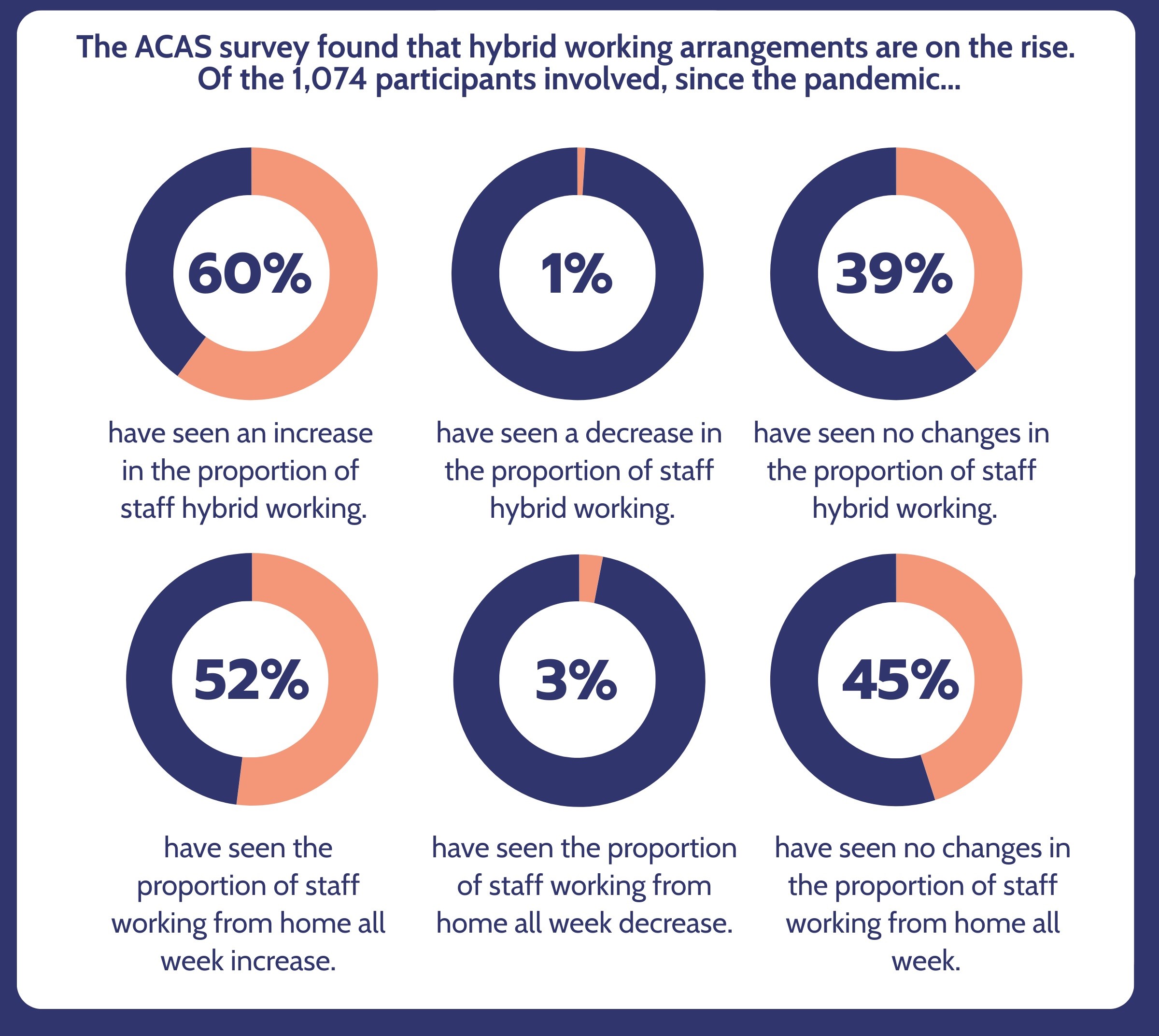
Following the coronavirus pandemic, many employees moved to working from home full-time, or as part of a hybrid arrangement. New data from the CIPD shows that more than three-quarters of organisations have embraced hybrid working since through a mix of formal and informal arrangements. This is not surprising given that the pandemic has shown us that many roles can be productively performed from home without traveling to the workplace.
In mid-June ACAS released the results of their YouGov survey of British businesses about changes in their working practices compared to before the pandemic. Here is what it found:
Hybrid is Most Common

These findings appear to be echoed in the CIPD results, which found that 78% of firms in the poll allow hybrid working either through formal or informal arrangements. Only 8% of firms said that they do not allow any hybrid working.
For 13%, hybrid working measures were said not to be applicable to the job or sector. Nearly six in ten respondents said that business leaders and managers are more likely to trust people to be productive while working from home compared to before COVID-19.
How Does Employment Law Influence Hybrid Working Arrangements?
With more employees seeking hybrid working than ever before, employers should keep up-to-date with the relevant legislation that applies to remote working. Hybrid working engages a number of legal frameworks placing obligations on employers, for example:
- The Working Time Regulations 1998 limit the working week to an average of 48 hours (there is an opt-out), and the working day to an average of 8 hours. Employers have a duty to ensure its employees are complying with the requirements whilst working remotely.
- The Health and Safety at Work Act 1974 covers all workplaces, including an employee’s home and states employers must do everything reasonably practicable to provide a safe and healthy workplace, which might include work station assessments of the home office that would otherwise have been done at the office premises.
- The Employment Rights Act 1996 gives employees with 26 weeks’ continuous employment the right to make a request for flexible working, which could relate, for example, to changes to their hours of work or the location amongst other things.
- Data Protection Act 2018 and UK General Data Protection Regulation Data protection law sets out what should be done to make sure everyone's data is used properly and fairly and would include an employer’s duty to ensure it operates compliantly through its employees.
There are also employee obligations arising from their contract of employment, which may well need to be revisited to ensure they and the policies supporting them remain fit for purpose, for example:
- Confidential Information and ensuring that it remains confidential. Employers will be keen to make sure that possession of confidential and sensitive information or trade secrets remains in the employer’s control and only in their possession.
- Equipment, such as whether employees will use their own devices or have devices provided, or the provision or use of a stable internet connection of an acceptable speed. If they are using their own devices, any software installations required to protect confidential and sensitive information.
- Expenses might arise from the hybrid working arrangement including landline rental, mobile phone charges, internet, and call charges. Employers may need to consider whether these are to be borne by their employees, or if not, whether their expenses policies need to be adjusted.
Here’s How to Learn More
Employers will be pleased to learn that there is now a wealth of free guidance available online to assist them to identify and consider the implications, challenges and benefits of hybrid working. ACAS published a statutory Code of Practice with accompanying guidance setting out best practice for handling flexible working requests.
ACAS have also published advice to help employers determine whether hybrid working is suitable for their workplace and how to introduce it, which includes advice to employers introduce hybrid working policies.
The CIPD published practical guidance on hybrid working in December 2021 and the Health and Safety Executive published guidance on how to manage home workers’ health and safety whilst they work remotely, including recommendations that employers should conduct risk assessments for remote workers and consider an employee’s working environment, equipment, stress and mental health. The Information Commissioners office has assembled helpful checklists to help employers keep data safe.
If you are an employer looking for customised support with your employees’ hybrid working arrangements, get in touch with us today!
Our experienced team of employment law experts provide a range of services from bespoke advice for a particular case, to reviewing and reporting on your existing policies, identifying compliance updates and suggesting upgrades to suit your needs or even drafting fresh contractual documents and policies tailored to your business.

